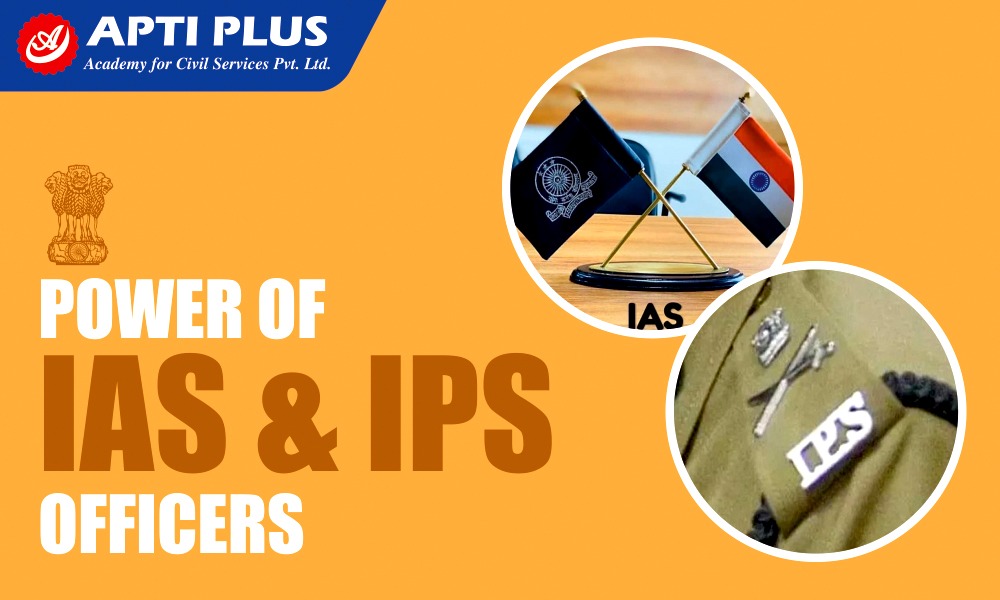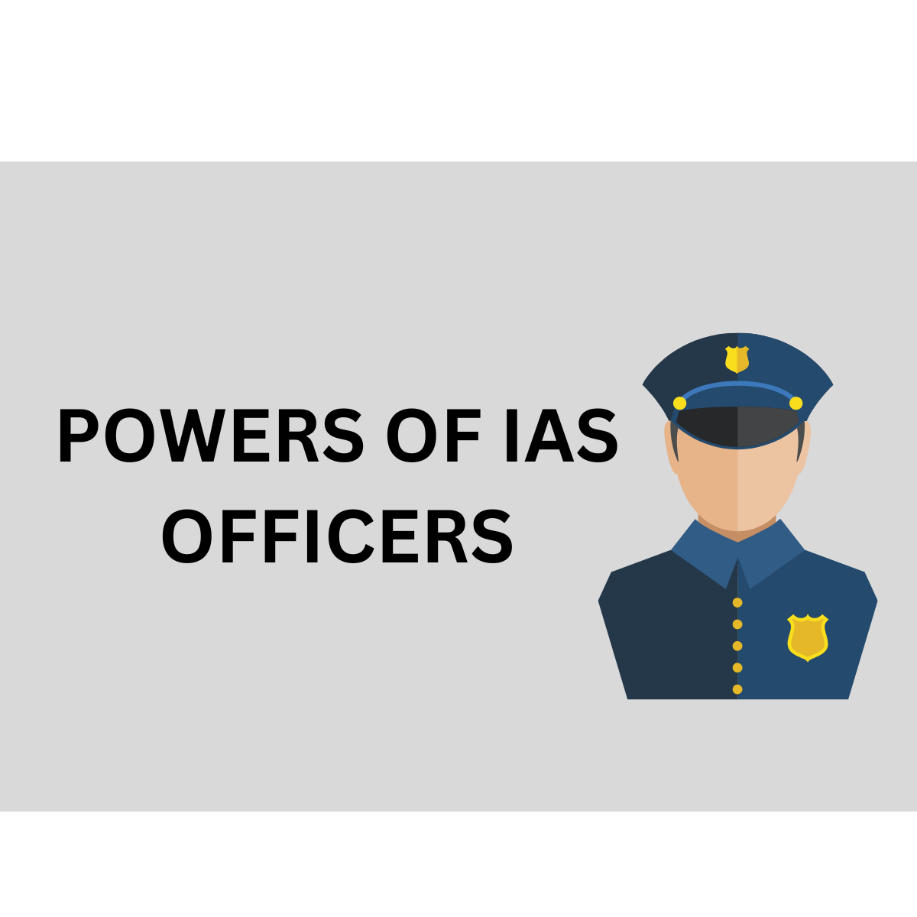Powers of IAS and IPS officers

The Indian Administrative Service (IAS) and Indian Police Service (IPS) are two of the most
prestigious civil services in India. These services are responsible for the administration and
maintenance of law and order in the country. The IAS and IPS officers have been given immense
powers and responsibilities to ensure that the country runs smoothly and that the citizens are safe
and secure.
Powers of IAS Officers

The IAS officers are responsible for the administration of various government departments and
agencies. They have the power to formulate policies, implement them, and oversee their execution.
Some of the powers and responsibilities of IAS officers are:
- Administrative Powers: The IAS officers are responsible for the administration of various departments and agencies at the state and central level. They have the power to appoint, transfer and dismiss government officials, and also to allocate funds and resources.
- Policy Formulation: The IAS officers are responsible for formulating policies related to various sectors such as agriculture, education, health, and public works. They also play a key role in the development of the country by implementing various schemes and programmes. IAS officers play a crucial role in policy-making at both the state and central levels. They provide inputs and recommendations to the government on various policy issues and help shape government policy.
- Implementation of Schemes: The IAS officers are responsible for the implementation of various schemes and programmes initiated by the government. They are expected to ensure that the benefits of these schemes reach the intended beneficiaries.
- Judicial Powers: IAS officers are also vested with some judicial powers. They can act as magistrates and have the power to order arrests, conduct investigations and initiate legal proceedings.
- Emergency Powers: During times of emergency such as natural disasters or civil unrest, IAS officers are given emergency powers to maintain law and order and provide relief to the affected citizens.
- Financial power: IAS officers are responsible for managing government finances, including budget preparation, revenue collection, and expenditure management. They are also responsible for ensuring that government funds are used efficiently and effectively.
- Supervisory power: IAS officers have the power to supervise the work of subordinate officers, including those from other services. They are responsible for ensuring that their subordinates perform their duties efficiently and effectively.
- Executive power: IAS officers have executive power, which allows them to make decisions and take action on behalf of the government. They can issue orders, make appointments, and take disciplinary action against government employees.
- Legal power: IAS officers have the power to exercise legal authority in their jurisdiction. They can issue warrants, conduct searches, and arrest individuals who violate the law.
- Diplomatic power: IAS officers also have diplomatic power and represent the government in various international and national forums. They participate in negotiations, attend international conferences, and represent the country in diplomatic missions.
- Social power: IAS officers have social power and are seen as role models in their communities. They have the ability to influence public opinion and shape public discourse on various issues.
IAS officers wield significant power and authority in their respective jurisdictions. They are responsible for ensuring that the government functions smoothly and effectively, and for implementing government policies and programs. Their power extends across various domains, including administration, finance, law enforcement, policy-making, and diplomacy.
Powers of IPS Officers

The IPS officers are responsible for the maintenance of law and order in the country. They have the
power to investigate crimes, make arrests and prosecute offenders. Some of the powers and
responsibilities of IPS officers are:
- Law Enforcement: The IPS officers are responsible for maintaining law and order in the country. They have the power to investigate crimes, make arrests and prosecute offenders.
- Security and Intelligence: IPS officers play a crucial role in ensuring the security of the country. They are responsible for gathering intelligence and preventing terrorist activities.
- Traffic Management: IPS officers are also responsible for managing traffic in the country. They have the power to regulate traffic and impose fines on violators.
- Emergency Services: During times of emergency such as natural disasters or civil unrest, IPS officers are given emergency powers to maintain law and order and provide relief to the affected citizens.
- VIP Security: IPS officers are responsible for the security of high-ranking government officials and dignitaries visiting the country.
- Administrative power: IPS officers have extensive administrative power in the areas where they are posted. They are responsible for ensuring the smooth functioning of police departments, implementing government policies and programs related to law enforcement, and maintaining law and order in their jurisdiction.
- Intelligence gathering: IPS officers have the power to gather intelligence to prevent crimes and maintain public safety. They can conduct surveillance, use informants, and monitor suspicious activities to prevent potential threats.
- Training and recruitment: IPS officers are responsible for training and recruiting new police officers in their jurisdiction. They can select and train police officers to ensure that they have the skills and knowledge necessary to enforce the law and protect citizens.
- Crisis management: IPS officers are responsible for managing crises and disasters in their jurisdiction. They can coordinate with other agencies to respond to emergencies, provide relief to affected citizens, and restore law and order in the affected areas.
IPS officers hold significant power and authority in maintaining law and order and ensuring public safety in India. Their powers extend across various domains, including law enforcement, administration, intelligence gathering, crisis management, training, and public relations.
Comparison of Powers

While both IAS and IPS officers have important powers and responsibilities, there are some key
differences between the two. Some of the differences are:
- Nature of Work: The IAS officers are responsible for the administration of various government departments, while the IPS officers are responsible for maintaining law and order in the country.
- Judicial Powers: IAS officers have some judicial powers, while IPS officers do not have any.
- Security and Intelligence: IPS officers have the responsibility of gathering intelligence and preventing terrorist activities, while IAS officers do not have this responsibility.
- Traffic Management: IPS officers are responsible for managing traffic in the country, while IAS officers do not have this responsibility.
- Decision-Making Powers: IAS officers are executive officers and have the power to make decisions on administrative, governance, and development matters. They can also take decisions regarding law and order but are required to work in close coordination with the local police force. On the other hand, IPS officers have policing powers and can make decisions regarding maintaining law and order, preventing and detecting crimes, and managing the police force.
- Power to Issue Orders: IAS officers have the power to issue orders to their subordinates and can even override the decisions of the subordinates if required. They can also give directions to the police department but cannot interfere in their functioning. IPS officers, on the other hand, have the power to issue orders to their subordinates, including the police department, and can make decisions independently.
- Power of Enforcement: IAS officers do not have the power to enforce the law or make arrests, as these powers rest with the police department. IPS officers, on the other hand, have the power to enforce the law and make arrests, as they are responsible for maintaining law and order.
- Power of Transfer and Posting: IAS officers have the power to transfer and post officials under their jurisdiction, including police officers. IPS officers, on the other hand, have the power to transfer and post police officers under their command.
- Power to Investigate: IAS officers do not have the power to investigate cases or conduct raids. IPS officers, on the other hand, have the power to investigate cases and conduct raids in matters related to law and order.
Conclusion

The powers and duties of IAS officers and IPS officers vary from each other. IAS officers are bestowed with executive powers, enabling them to make decisions regarding administration, governance, and development. Although they can make decisions regarding law and order, they need to closely work with the local police force.
In contrast, IPS officers have police powers and are accountable for ensuring law and order, preventing and identifying crimes, and managing the police force. They possess the authority to make decisions regarding law and order and have the autonomy to exercise their powers.
The IAS and IPS officers are two of the most important civil services in India. They are responsible for
the administration of various departments and agencies, and the maintenance of law and order in
the country. Both these services have been given immense powers and responsibilities to ensure
that the country runs smoothly and that the citizens are safe and secure.








